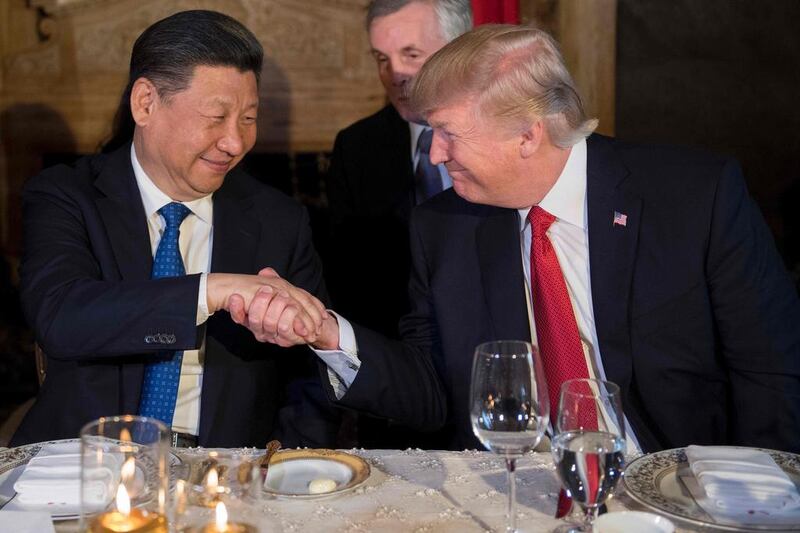Donald Trump will be in China almost a year to the day since he was elected US president, but who is the most powerful man in the world? Is it Mr Trump or Xi Jinping, his Chinese counterpart?
The question is posed at a particularly difficult time for this White House. Robert Mueller, the special counsel investigating alleged Russian meddling in the US election has issued his first indictments and three of Mr Trump's former campaign aides have been charged. Mr Trump and the Republicans now face a midterm election year with the Russia affair hanging over everything like a pall. And the US president may find it harder to concentrate on governing with the Russia investigation potentially threatening some of his associates. There is also the question of moral authority, something American presidents have routinely claimed for themselves especially in relation to the leaders of China and Russia. An active independent investigation into alleged "conspiracy against the United States" – one of the indictments filed against Trump aides – tests the presumption of moral authority.
But even if the US had a different president, the question of global pre-eminence would still arise. China has the world’s largest manufacturing output, as well as a larger GDP and four times the population of the United States. But the US has the most nuclear weapons, the largest military and has been the world’s sole hyperpower since the collapse of the Soviet Union.
Negative political theology may be a better way to see the evolving world order. When Mr Trump meets Mr Xi, neither is the world's most powerful man, because neither the US nor China bestrides the world now. Consider the jockeying between the two countries in diverse fields in just the past few days. From Tennessee in the United States, came news that the world's fastest and most powerful supercomputer will be operational next year. It would supersede the Chinese machine that currently holds that rank. And in Azerbaijan, a new railway line linking Baku, Tbilisi, and the Turkish city of Kars opened for business on Monday. It is a key part of China's Belt and Road Initiative of trade corridors to link it to Europe.
_________________
More from Opinion
[ What does the future of work look like? Well, the outlook is rosier than you think ]
[ Balfour Declaration: how Britain broke its feeble promise to Palestinians ]
_________________
Negatives define both China and the US. Much of China's strength and stability rests on what it is not. China is neither a free political society nor a multi-party state. The recently ended 19th Congress of China's Communist Party elevated Mr Xi's authority beyond anything possible for an American president and did away with the restraint of collective leadership instituted after Mao Zedong's excesses. Yun Sun, a researcher on Chinese foreign policy and US-China relations at the Stimson Center, a nonprofit, nonpartisan think tank, recently pointed out that in the past five years of Mr Xi's leadership, China's ruling party has shrouded decision-making in even greater secrecy. It has also introduced a new disciplinary term ("improper comments") for questions about central government policy.
In the US, by contrast, the executive's lack of complete control over the other branches of government makes the system strong and worthy of emulation in other parts of the world. But it also paradoxically renders the American system weaker than that of China. Unlike his Chinese counterpart, Mr Trump cannot simply pronounce from on high and be absolutely certain his orders will stand firm against a challenge in the courts or a congressional slapdown. Mr Trump's repeatedly stymied attempts to institute a somewhat idiosyncratic ban on the entry of certain foreign nationals to the United States is a case in point. So too Monday's ruling by a federal judge in Washington, blocking Mr Trump's attempt to prohibit a specific section of Americans from serving in the military.
Clearly, Mr Xi’s position carries more absolute power than that of Mr Trump but it is not a given that this strength will translate into the unchallenged worldwide status enjoyed by the US for decades.
That said, there are fears that healthy and natural jostling between the US and China may create conditions for the so-called Thucydides trap. This is the situation first identified by the ancient Greek historian Thucydides who explained that tensions between a rising power and a ruling power – Athens versus Sparta – inevitably result in war.
In his new book Destined for War: Can America and China Escape Thucydides's Trap? Harvard professor Graham Allison lays out the likely triggers for conflict. An impasse over North Korea, along with further testing of inter-continental ballistic missiles by its leader Kim Jong-un could be a flashpoint.
But perhaps the best chance of avoiding war is the negative political theology that defines our times. With both the rising power and the ruling power hamstrung by the particularities of their own systems, there is a stalemate of sorts. Their competition is bound by what John F Kennedy called "precarious rules of the status quo."
That is as good as it gets, all things considered.





